|
|
Sunday, March 22nd, 2009 at 12:19 pm
WARNING: this post contains images that may be disturbing to some. If you are opposed to the killing of animals, you may want to skip this post. Likewise, if you are one of my friends that uses this blog as an educational took for your children, you may wish to review it alone first so you can better explain what’s going on.
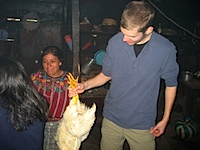 Welcome to the third installment of the “matando” series of lectures, where we talk about traditional rural meat processing techniques. Previous entries included matando kalnel (killing sheep), matando txitam (killing pigs), and today’s will be matando kaxlan (killing chickens). Welcome to the third installment of the “matando” series of lectures, where we talk about traditional rural meat processing techniques. Previous entries included matando kalnel (killing sheep), matando txitam (killing pigs), and today’s will be matando kaxlan (killing chickens).
Our friend Devin is in town, and he wanted to do something nice for our neighbors. Emily had a great idea: how about buying a tasty chicken for them to put into their stew pot? Chicken stew is a favorite around here, and people don’t get to eat it a lot because meat is expensive. “You mean, a live chicken?” Devin asked, getting into the spirit of things. Um, we hadn’t really thought about that. So we mentioned it to the neighbors, who immediately realized that if we bought a live chicken, they would be the ones killing and cleaning it. They teased us a bit, then agreed: it’s hard to turn down a 100q gift, even if it does mean a little dirty work.
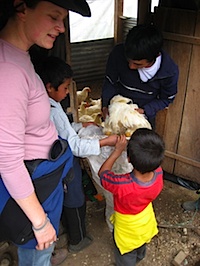 So, we headed off on a hike to the neighboring village, where they sell roasting chickens. They sent Chalio and Alberto as our hobbit guides. Not only did we not know where the chickens were to be found, but we also don’t speak enough Q’anjob’al to do a good job with the negotiations. Turns out, sending the kids to help the bumbling adults was a great idea. Chalio did as good a job as you could expect from any 10-year-old, and he picked out the biggest chicken in the pen. He then got them to charge us only 90q instead of the expected 100. Success! So, we headed off on a hike to the neighboring village, where they sell roasting chickens. They sent Chalio and Alberto as our hobbit guides. Not only did we not know where the chickens were to be found, but we also don’t speak enough Q’anjob’al to do a good job with the negotiations. Turns out, sending the kids to help the bumbling adults was a great idea. Chalio did as good a job as you could expect from any 10-year-old, and he picked out the biggest chicken in the pen. He then got them to charge us only 90q instead of the expected 100. Success!
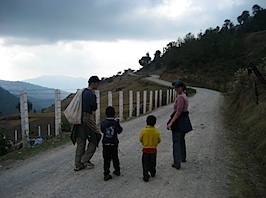
Chicken in sack, we headed back home. The bird was kindof heavy and prone to occasional fits of squawking and flapping, so Emily and Devin traded off carrying. If you enlarge the picture, you can see a chicken toenail poking out of the gunnysack on one side, and a beak on the other.
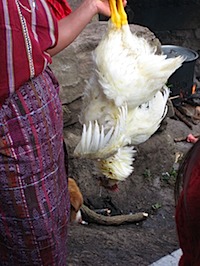 When we arrived at our neighbor’s, Emily asked how they kill it. We had imagined cutting heads off with axes and chickens running around headless, as we were told by our grandparents, but it turns out it’s a lot less dramatic or messy. Masha holds the chicken so it can’t flap, and Reyna twists the head around and around. At some point, it’s more than the design load of the chicken, and death results. When we arrived at our neighbor’s, Emily asked how they kill it. We had imagined cutting heads off with axes and chickens running around headless, as we were told by our grandparents, but it turns out it’s a lot less dramatic or messy. Masha holds the chicken so it can’t flap, and Reyna twists the head around and around. At some point, it’s more than the design load of the chicken, and death results.
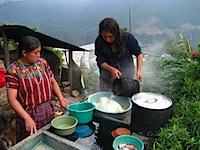 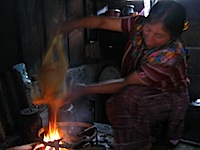
Then they take the drooling, limp chicken outside to the rubber basin where they pour boiling water over it. That loosens the feathers so they come out easier. Reyna and Masha make short work of it, then the chicken goes inside to be dangled over the fire, burning off the pinfeathers.
Then it’s back out to the sink and the knife. “Guess what?” Devin asks as they cut off the part that holds the tail feathers. “What?” I reply. “CHICKEN BUTT!” he exclaims.
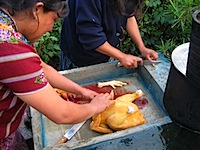 The rest of it was pretty straightforward. I only cringed at one part, and it was not because of all the blood-n-guts. Check out what they’re doing with that nice knife I got them for christmas: they’re cutting with it directly on concrete! AAAAAAA! When you give something away as a present, you just have to let it go, I guess. Let it go. Let it go. The rest of it was pretty straightforward. I only cringed at one part, and it was not because of all the blood-n-guts. Check out what they’re doing with that nice knife I got them for christmas: they’re cutting with it directly on concrete! AAAAAAA! When you give something away as a present, you just have to let it go, I guess. Let it go. Let it go.
Once drawn and quartered, the chicken gets stewed. They like to cook the feet, too, as they lend a tasty flavor and add the yellow color to the stew. Everything goes into a big boiling pot, along with a few tomatoes, some monte (random green plants pulled from the hillside) and about half a cup of salt. They love salt. A few hours later, once the chicken is cooked, it comes out of the pot and they pour in some macaroni. While the macaroni is getting soft, Lina (the mom) tears the steaming chicken apart into chunks, and distributes it evenly between all the waiting bowls. Then, the broth/macaroni soup is ladled on top. Dinner for all!
 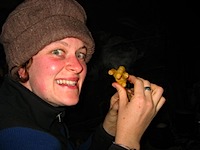
Here are Devin and Emily nibbling on tasty chicken toes. I would have none of it; I put up with enough food foolishness in Guatemala as it is.
Posted by: jfanjoy
Friday, March 20th, 2009 at 8:09 pm
Some of you have been following the progress of the Computer Center I am trying to arrange for my village. It’s been a slow, sometimes aggravating process: the equipment is donated, the transportation is donated, and I am not in a position to tell anyone what to do; it’s all about asking. In my former job as an architect, clients told me what to do and I had to do it. I told contractors what to do, and they had to do it… or I got someone else to do it. Likewise, if I slacked off on my work, my clients would go elsewhere. Nothing personal; it’s just how business works. This same sort of thing was frustrating for my dad when he moved from being a colonel in the air force to being a professor.
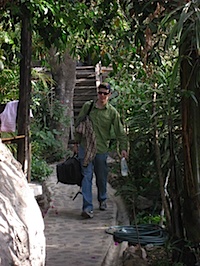 Here, though, I am at the whim of everyone who is donating time or supplies. It requires a lot of patience, but when things work out, the payoff is fantastic. Last week, our friend Devin arrived in Guatemala towing two pelican cases crammed full of laptops, networking cables, routers, and flat panel monitors. His family graciously donated more than half of it, and they still have other things ready to go when we can work out transportation. Devin agreed to bring the two ominous-looking cases with him to Guatemala, sight unseen, and was forced to repack them IN THE TICKET LINE at Chicago at 2am to get the weight balanced right. Then, when he arrived at Guatemala airport at 7am, the customs guys flagged him immediately. Here, though, I am at the whim of everyone who is donating time or supplies. It requires a lot of patience, but when things work out, the payoff is fantastic. Last week, our friend Devin arrived in Guatemala towing two pelican cases crammed full of laptops, networking cables, routers, and flat panel monitors. His family graciously donated more than half of it, and they still have other things ready to go when we can work out transportation. Devin agreed to bring the two ominous-looking cases with him to Guatemala, sight unseen, and was forced to repack them IN THE TICKET LINE at Chicago at 2am to get the weight balanced right. Then, when he arrived at Guatemala airport at 7am, the customs guys flagged him immediately.
“What do you have in the boxes?” they asked.
He explained the computer parts, and the customs agents wanted to charge him an import tax. Luckily, Devin speaks Spanish and is a quick thinker. He told them they were for a Peace Crops aid project. “Where’s you letter?” they asked. Of course, he didn’t have one. “In that case, you will have to leave them here in our care until the letter is ready,” they responded. Devin then concocted an elaborate, well-contrived story about how we needed to take them to the mountains right away, and how disappointed his church would be if they were held up at the airport, etc. Eventually the customs agents caved in, sending him on his way with a stern warning and a stamp in his passport that will get him fined double if he brings any other computers into the country in the next six months.
Devin is going to spend about 10 days with us, so you’ll be hearing more about him in a future post. 🙂
We stayed in Antigua two extra days to pick up the monitors I mentioned in the previous post. Once we had all this gear together in the Peace Corps pickup, the driver took me and my toys back to the Peace Corps headquarters. I unloaded it all into a storage room, to await the last four boxes of computers. I’m not out of the woods yet; transportation is the single toughest hurdle for this project, and I am especially grateful to all those that have helped in this regard. I have two more suckers…err… volunteers lined up to help in a similar manner, when they fly to Guatemala in the next few weeks.
Once everything is here, the villagers are going to pool money together to send a microbus on the long journey from my site to Peace Corps HQ. It’s about 2000q, which is a fair chunk of cash for them. But it’s important that they have to pay for part of the project, to better value what they are getting, and so they don’t get used to the idea of getting anything for free. We’ve had a lot of trouble with that in other places. They village has also promised to pay provide a secure location for the computers, pay for electricity, and provide desks and chairs. These are all things within their reach. Once we’re set up, then we can start getting into training, and the real work begins.
Posted by: jfanjoy
Thursday, March 19th, 2009 at 2:27 pm
Several months ago, I met Bill Milliken, a returned Peace Corps Volunteer from Kenya. He’s now working as the outdoor adventure coordinator for Eastern Washington University. During our discussions, he lamented that the students he takes abroad get to see touristy things like Antigua, Lake Atitlan, ziplining, whitewater rafting- but never the true face of Guatemala, life in the rural villages, the sorts of things that Peace Corps volunteers get to experience. This got us to thinking: for his next trip to Guatemala, could we set up homestay visits for his students, where they could spend a few days living with PCVs in their sites?
Within a month after his return to the US, we started planning. The honors college at EWU had approached Bill to arrange a spring break trip for a group of students, and he shared his idea with the dean of the honors college. The dean was floored. “What a fantastic opportunity that would be for the students!” he beamed, and lent his full support to Bill. They ran the gauntlet of the risk management committee, the university advisory board, etc. and got approval.
At the same time, I was explaining the program by my boss and our national security director. The plan was that we’d put two students with a volunteer, and they could go to work for a day (doing whatever the volunteer does; building water tanks, giving health lectures, whatever), then spend a weekend with them in their site, seeing local sites and meeting Guatemalan families. The bosses at Peace Corps were enthusiastic, and it’s a good way to promote the third goal of Peace Corps (to help Americans get a better understanding of foreign cultures). Their reservation was that we could only use PCVs that are in well-established sites that have seen a fair amount of white people, so as not to scare the locals. Sadly, that excluded most of my buddies, and even Emily and me! But I was able to find plenty of other enthusiastic volunteers from other programs.
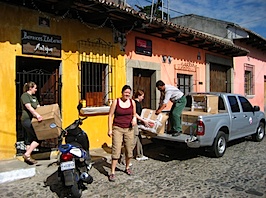
So, after several months of planning, the students finally arrived in Antigua. They have a strange mix of excitement and incredulity at the goings-on here. We met up at their hostel, where they handed over all the computer monitors they brought me.
Oh, did I mention that? Bill hooked me up with eight computer monitors from the “too old to use” basement at Eastern Washington. Then, he talked his students into bringing them on the plane as their second piece of luggage! Awesome! The students were good sports about the whole thing, and really did their part to help out some needy Guatemalans. Here we are, loading up the Peace Corps truck I requisitioned for the event.
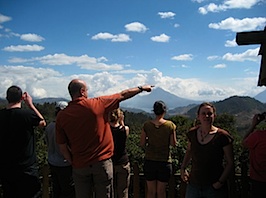
That afternoon, we all rode out together to Xela. In the 4-hour trip we passed a lot of things you’d not normally see in the US: volcanic lakes, farms on 45-degree hillsides, native Mayans hocking things at rest stops, horses with gunshot wounds to the head lying dead by the side of the road. One poor guy almost got kissed by a drunk four-and-a-half foot tall grannie. Welcome to Guatemala!
Emily and Bill had arranged dorm rooms for all the students and PCVs, and Bill (ok, EWU actually) took everyone out to dinner so the students could meet their PCV hosts. It was a great time, filled with lively and enthusiastic discussion as we got to know each other over a hearty helping of pepian, a classic Guatemalan dish. Towards the end of the evening, I got up and thanked everyone for their participation: the PCVs for volunteering their time, and the students for coming. For me, it’s a powerful thing when Americans take a chance and break out of their “safe zone”, widening their outlook on the world and how it operates. My hope is that they will take this experience back with them, and share it with their friends, families, and coworkers. We can learn about ourselves, when looking through the filter of someone completely alien to us.
I hope that everyone comes back with great stories and amazing adventures. I also hope that everyone stays safe; it would be nice to do this sort of thing again.
Posted by: jfanjoy
Sunday, March 15th, 2009 at 3:58 pm
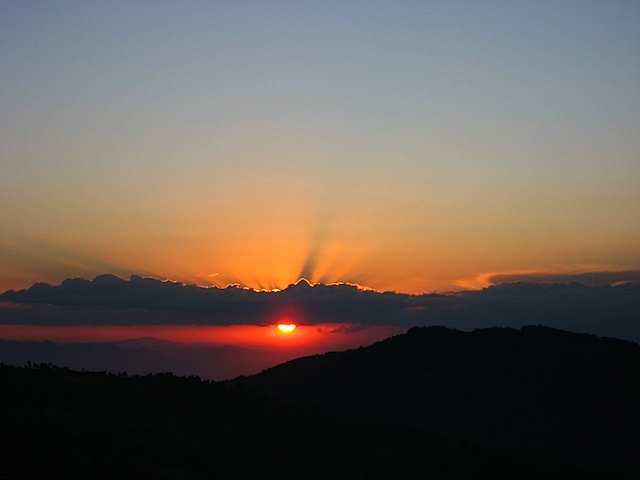
This was our sunset a few days ago. We live in a REALLY pretty part of Guatemala. If you click on the image, it will bring up a higher resolution verson you can “save as” to make your computer desktop. If you’re into that sort of thing.
Posted by: jfanjoy
Sunday, March 15th, 2009 at 11:22 am
Emily and I generally feel like we’re starting to get the hang of living in our village. The neighbors come by to chat, we get invited to cultural activities, we can occasionally speak in complete sentences in Q’anjob’al. Everyone smiles at us. Then, something like this comes along and makes me remember that no matter how much we progress, we still live in a small town full of people that are all related to each other, whose families have been here for hundreds of years, and have a culture completely alien to us. No, we actually don’t have a clue what the heck is going on here. Let me explain.
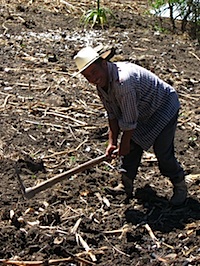 Last month the dry season hit, and the stream by our house (and all the others in town) dried up. We now get our water from a few hoses that run down the mountainside from a spring several hundred feet above us, put in place by Nas Palas himself. Don Palxun, one of our neighbors, also gets his water in the same way. Last week I was helping Nas plant corn, and during a break we got to talking about water. He explained to me that the spring is jointly owned by the two of them, and there used to be 10 shareholders, but all the others sold their shares out to the community…and no longer have the right to use the spring. “Wow, why didn’t you two sell?” I asked. This is a sticking point with me, because for the village to get international aid for a water project, a prerequisite is that the town must own the spring, to ensure that it will always be shared properly. It struck me as strange that Nas Palas, the super community-minded guy, would be the holdout, and I wanted an explanation. “As you know,” he said, “The flow is really low on that sprng. It’s plenty for 10 families, but if the whole community uses it, there won’t be enough water for ANYONE. At least this way, it’s still benefitting somebody.” So he refused to sell. Sensible, practical, but still not very community-minded. Last month the dry season hit, and the stream by our house (and all the others in town) dried up. We now get our water from a few hoses that run down the mountainside from a spring several hundred feet above us, put in place by Nas Palas himself. Don Palxun, one of our neighbors, also gets his water in the same way. Last week I was helping Nas plant corn, and during a break we got to talking about water. He explained to me that the spring is jointly owned by the two of them, and there used to be 10 shareholders, but all the others sold their shares out to the community…and no longer have the right to use the spring. “Wow, why didn’t you two sell?” I asked. This is a sticking point with me, because for the village to get international aid for a water project, a prerequisite is that the town must own the spring, to ensure that it will always be shared properly. It struck me as strange that Nas Palas, the super community-minded guy, would be the holdout, and I wanted an explanation. “As you know,” he said, “The flow is really low on that sprng. It’s plenty for 10 families, but if the whole community uses it, there won’t be enough water for ANYONE. At least this way, it’s still benefitting somebody.” So he refused to sell. Sensible, practical, but still not very community-minded.
Usually when I have these kinds of discussions, I then repeat back everything that was said.This is a good way to make sure I understood correctly, overcoming the language and cultural miscommunication that so often happens here. The Mayans are REALLY patient people, and a 10-minute recap doesn’t bother them in the slightest. This time, it got me even more information. “…and you and Palxun have water, but the rest of the village does not during the dry season,” I concluded.
Nas Palas raised his eyebrows. “Oh, most of them have water,” he corrected me. “About a hundred houses in town have agua entubada y chorros (a tubed distrubution system with water taps) connected to a big tank at the edge of town.” My jaw hit the floor; I’d never been told about this. He continued: “About 15 years ago, an aid project came and built it all. At the time, I was out of town working the coffee crop, so the village just skipped my house.” AHA! Now it’s all starting to make more sense. And Nas looked a bit bitter as he told that part of the story, though he tried to conceal his disdain for the situation.
Then I remembered seeing a tap in Manuel’s workshop, outside his house. “Oh, yeah, even Manuel has one,” Nas explained with a wink. “But he didn’t put it in; his grandma did that.”
This is all kindof embarassing, as Emily and I gave a lecture a few months ago on water systems, how they work, and how to solicit a project to develop one. In fact, we even did some preliminary negotiations with an engineer to design it and I took flow measurements at the spring. Of course, at no point in the process did anyone ever stand up and say, “Hey, dumbass, we know this stuff already and ran million-quetzal project like that 15 years ago.” It’s just another example of how they (don’t) communicate here.
A few days later I was hanging out with the aforementioned Manuel, our counterpart and president of the health comittee. “Come with me to the tank, we need your help,” he asked. Since I’d recently heard about the tank, I could play it cool and not be suprised; but also, it was a great chance to see it firsthand. Turns out, about this time every year the spring that feeds the town tank runs really low, and the water level in the tank goes down far enough that they can drain the tank entirely, clean it, and refill it. They wanted me to measure the tank and do a calculation on how much chlorine bleach to throw in to sanitize it afterwards. No problem, that’s easy.
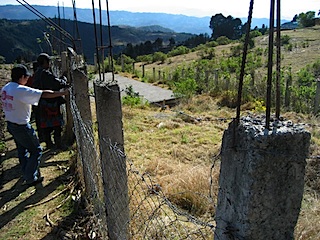 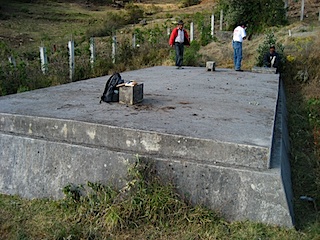
We got to the tank and I was suprised. It’s a giant, below-ground deal with a big concrete lid. And by giant, I mean 60,000 liters. “Where did this COME from?” I asked the four men present. This launched a half-hour discussion where I feel like I finally got the full story… maybe. Turns out, an aid group from Europe came by and in 1994 helped them to construct the tanks, distribution system, spring enclosure, everything. They donated materials exceeding a million quetzales. It serves 68 houses, but the town has grown enough that it is no longer sufficient. They also told me that they are soliciting another water project, where they plan to cap Nas Palas’s spring (that the community has a 70% stake in), build a second tank nearby, and run a tube from that one to the big existing one to increase capacity. “But how do you know what to build? If the spring us big enough? What materials are needed?” I asked.
Turns out, about three years ago an engineer from a European NGO came by and worked up an estudio (research & design) for them that includes plans, topography, hydrology, tank engineering, and a materials list. “Would you like to see it?” they asked. You bet I would. “I can bring it over to your house next week,” one of the elders replied. They also told me that they are working with a lawyer in Huehuetenango, who is representing them as they solicit the 800,000q they need for the project. They are in negotiations with both the Spanish and Japanese embassies!
I guess my ignorant, helpless villagers aren’t so much after all. There is SO much we don’t understand here.
Posted by: jfanjoy
Thursday, March 12th, 2009 at 10:10 pm
When we met with the Stove Team back in January, Nancy Hughes, the director, mentioned to us that she got involved in the stoves as a preventive health measure. She explained that she used to work, along with her husband who was a doctor, with a group called the Cascade Medical Team through HELPS International. They would come to Guatemala for one week every year to offer their professional skills, but even in those short visits she met numerous plastic surgery patients who were having things like their hands reconstructed after suffering from burns as children. Their mothers cooked over open fires, and children playing in the house were prone to accidents. Fletch strated talking to her about all the services HELPS offers. He remembered a man from our village telling us in November about losing sight in one eye. He’s a truck driver who drives loads of recyclables into Xela, 7 hours away. With sight in only one eye he can no longer drive in the city where the traffic is intense. He thought his site was going in the other eye now, too. Nancy knew the team was coming the first week in March, and she gave us the contact information to see if we could get our villager to the team’s optometrist. Thus, we were hooked up with the Cascade Medical Team.
Fletch contacted the team to confirm the eye doctor was coming, and relayed the man’s problems. We then went to his house up the road where we sat down with him and his daughters, two of whom have very proficient Spanish and could clarify anything the man needed. They were thrilled with the prospect of someone being able to fix their father’s sight. We kept telling Juan Francisco that this was far from a guarantee they would be able to operate and fix his vision. However, the doctors in Guatemala City had told him the operation would cost 22,000 quetzales (he makes about 30q a day when he has work), so a potentially free operation was definitely cause for excitement. We didn’t want them to get overly excited or to accidentally foster false hopes, so we tried to make it as clear as possible that they would have to pay for the trip there and back, but the medical costs would be completely covered. They said they were in.
Once we confirmed with the organizers, they asked us if we might be able to translate some, as they were short in that department. Both of us jumped at the chance, to the extent that we called our boss and begged out of the first day of In Service Training (they were just doing stuff we know how to do anyway). And we were off early Saturday morning to travel about 10 hours to Panajachel, one of Guatemala’s best known tourist destinations. We decided to stay the night there to enjoy sleeping-in at least one of our weekend days and we could also get a tasty breakfast at one of the many tourist restaurants before heading up the hill to Solola where the temporary hospital was set up.
We stayed just off the Cathedral square in Pana, so here’s what we came across walking home from dinner Saturday night. This town is at the edge of the volcanic lake where we stayed for my birthday in August. We 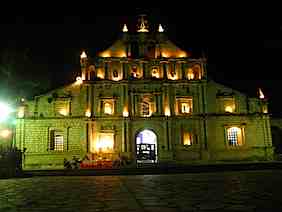 actually had a big debate about whether or not we wanted to stay in Pana on Sunday night also, or stay with the medical team. Fletch had forgotten to mention that was option until after we arrived. We kept going back and forth on the issue, as not staying with them meant eating where ever and what ever we wanted as well as some privacy, which we get precious little of here. Staying with them meant a free bed, free food, and a chance to socialize with new people. The latter won out. actually had a big debate about whether or not we wanted to stay in Pana on Sunday night also, or stay with the medical team. Fletch had forgotten to mention that was option until after we arrived. We kept going back and forth on the issue, as not staying with them meant eating where ever and what ever we wanted as well as some privacy, which we get precious little of here. Staying with them meant a free bed, free food, and a chance to socialize with new people. The latter won out.
On Sunday morning as we were sitting on the bus to Solala I spotted a women who looked like Maria, Juan Francisco’s daughter, and sure enough it was her. We’d planned to meet just outside the medical area, but things worked out perfectly, so we rode together and entered the medical compound together, which made our friends the first Guatemalan patients to enter. They totally got to jump the line that started at 3 am Sunday morning. They sat in the sun relaxing and waiting in the infinitely patient way that only Guatmalans can, as we ran around trying to figure out what’s was going on.
It was totally insanity. We were told to go claim our beds in the respective dorms, men and women separated, of course. There were only cots left, so I had to jam what would have been a rather comfortable 3 person room with a fourth bed and my hiking pack, but the ladies who invited me in were very kind about it. I assured them I was only going to be there one night, if they were overjoyed with that news they did a good job not showing it. The general atmosphere was one excitement and eagerness. All these people have come to Guatemala to help, and I think they were excited about doing it.
After finding our beds we went to find food before we started to work, as instructed by the coordinator. We found and unbelievable amount of food. It was like walking into the camp kitchen at the beginning of a ten day session, endless possibilities of food…And it was all such American fare it was really kind of exciting. However, none of the food was prepared, it was all being organized for the kitchen staff’s ease and convenience, so we helped unpack, and then left to find the translators without having eaten.
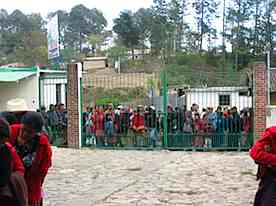 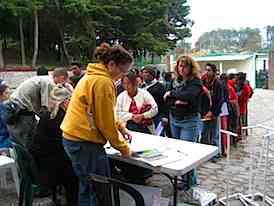 The line at the gates was pretty intense, but we had to set up the entry process before we could let anyone in, then stall as the medical staff finished setting up. But soon enough all was ready, and we started admitting people. We being a loose term. Somehow Fletch figured out where to jump in, and he had work, but I spent a while waiting around for an opportunity. In that time I had to marvel at the sheer scale of this project, and all the different people–type A aggressive medical professionals who want to get stuff done and all have their own way of doing things–as they had to work around what they thought/wanted and come up with fast solutions to ease the process of checking patients and getting them to the correct doctor at the clinic. I saw quite a few people begin to speak and bite their tongues before moving on to something they deemed more productive. And I had to admire their get-it-done way of working together without stepping on people’s toes. The line at the gates was pretty intense, but we had to set up the entry process before we could let anyone in, then stall as the medical staff finished setting up. But soon enough all was ready, and we started admitting people. We being a loose term. Somehow Fletch figured out where to jump in, and he had work, but I spent a while waiting around for an opportunity. In that time I had to marvel at the sheer scale of this project, and all the different people–type A aggressive medical professionals who want to get stuff done and all have their own way of doing things–as they had to work around what they thought/wanted and come up with fast solutions to ease the process of checking patients and getting them to the correct doctor at the clinic. I saw quite a few people begin to speak and bite their tongues before moving on to something they deemed more productive. And I had to admire their get-it-done way of working together without stepping on people’s toes.
Finally a doctor with no Spanish skills showed up, looking lost. His name was McGuiver, so he should have been able to find his way out of any situation with confidence if he was true to the name, but I jumped at the chance to help someone. All this did was get me from the entrance to the clinic where the doctor promptly disappeared, so I waited around some more until I saw someone in need. I jumped in to explain the line system, to usher patients, and finally to go with the next doctor who raised his voice with urgency, “Translator?!” then I ran. I spent all afternoon in the clinic going from one doctor to the next, checking out hernias (there are A LOT of those here in Guatemala), doing gyno exams, ultrasounds, explaining when and where and how procedures would take place.
The matter of translation is pretty interesting, in my opinion. You need to be aware of who your audience is, what’s important to them, how well they speak the language you’re translating to. I felt like I had a distinct advantage over the spanish speakers who came from the states with the team to translate. I was translating for an aneasthesiologist who seemed like the kind of doctor I would trust in the US. She was thoroughly explaining the different options for preparing this mute guy with severe scoliosis for his hernia procedure the next day. The dramatic curvuture of his spine was tricky for them. But she was explaining, “This is what I could do, and how it works, but won’t I won’t do because it doesn’t sound like the best option. Here’s what I think I will do, because I think it will work better. I’ve done a similar thing on a similar patient in Africa.” Her approach was just what I would want under normal circumstances. However, she was translating for a family that speaks K’iche as their maternal language. The patient is mute and the rest of the family has shakey spanish. All I would do in translating everything she said was confuse the hell out of them. But I felt self conscious letting her talk forever and then giving them a two sentence translation. So I said, “I don’t mean any disrespect, but they hardly speak Spanish, and I think the best thing is probably to tell them exactly what you’re going to do, and what time they need to be here and be done.” She looked kind of aghast and stuttered, “Yeah, but… I mean, ok. Whatever.” I then felt bad for having said anything. Like I said, she’s exactly the kind of doctor I would trust in the states because I want to know that information. Here they play a very different ball game.
The consultations were really interesting, and all the medical staff was working so hard. The worst case was this woman whose family had driven from the Peten to Solala, which on Guatemalan roads in this landscape of mountains was a nearly 20 hour journey. The woman had a huge growth of some sort on her knee, but was checked out for the massive abdominal tumor that disformed her belly. The doctors wanted to help her and get the tumor out asap. She was scheduled as the first surgery on Monday morning. However, they took a vial of blood to check out some preliminary stuff and found she had terribley low iron. Anemia is an endemic problem in Guatemala as the diet here doesn’t include enough green vegetables and meat is so expensive for the poor campesinos. It’s such a problem the government regulates that regular white sugar be fortified with iron, as Guatemalans consume ridiculous quantities of that. The team didn’t have a blood bank, so they couldn’t give her a transfusion. The tumor was so huge she was going to lose too much blood and be left dangerously weak. Much to everyone’s chagrin they had to cancel her surgery. They sent her away with iron pills and a referral to the next jornada in San Marcos in April. I was translating all the bad news to her and a man I assume was her adult son. I asked the doctors, “Can I tell her she needs to eat iron rich foods too, would that help?” A nurse jumped in and said, “Don’t bother; they don’t have them here.” But they do, too! There are 3 well known varieties of edible leafy plants growing in the campo that the indigenous populations are aware of and eat from time to time; they just don’t eat enough. So I told her she should try to eat as much of those as she could. The woman said they bother her stomach. The doctor said the pills might also upset her stomach. I told her that, but I explained if she didn’t take the pills and eat more greens she had no chance of having the surgery next month because the problem wasn’t going to fix itself. Everyone sighed. Her son said, “Well, she’s really just worried she has cancer. Can you just tell her she doesn’t have cancer?” No, I couldn’t, and I had I feeling I knew what the doctor’s response would be. I told the doctor; he said it was quite likely it was cancer since she had two enormous tumors, but they would have to do a biopsy to know for sure. This jornada lasts 10 days and results for a biopsy here take close to a month. So I passed on the bad news, the pills, the referral sheet to the next chance at an operation, and we sent the family on their way. I feel like everyone involved felt a little bummed, but their limitations here are so many. I heard over and over, “This would be so easy in the states.”
When the clinic finally stopped seeing people I realized I was starving. About that time Fletch showed up–I hadn’t seen him since the front gate–and we hung around talking to the doctors and lab techs for a while. By the time I got to dinner I was dying to eat, and then eating just about killed me. I started having really bad abdominal cramps and apparently scared the nurses at my table as I turned white as a sheet. “Well, if you’re going to faint, here’s the place to do it. We’ve got all kinds of people who can take care of you,” one said. I was just waiting for it to pass. I have this any time I don’t eat; I get really suddenly ill when I start to again later. It passed, like it always does, but not before I got to have my own little interview with a doctor regarding this issue. I assured him it’s just when I don’t bring a snack with me (which Fletch and I had planned on doing that morning and then decided against doing-bad move). The doctor didn’t hassle me too much, but told me if this becomes a frequent thing I should have my blood sugar level tested. 😛 I think I just need to eat like a normal person and I will be fine…So once that was over I met up with Fletch again (he’d stayed in the lab so we didn’t eat together), and we hung out with the organizers who’d invited us. They were so much fun, we were the last people to leave the dining hall.
I spent Monday morning translating for the dentist and dental assistant (the latter doubled as one of my roomies the night before). The team was pretty awesome, as they whipped through extractions like nobody’s business. The doctor kept commenting on how this numbing shot or that would, without fail, elicit some sort pained moan from all patients in the states, but here everyone just sat through the shots. She just kept repeating, “I can’t believe how stoic people are here.” At one point she had to do a molar extraction on this man, the tooth with the deepest roots up into the cheek bone, and the roots broke off, half of them staying in the gum. The dentist was twisting, yanking, cutting, with so much force, and the man said nothing. His eyes looked like those of a trapped animal, but he didn’t make a sound. Another woman was a rather chatty drama queen, but it was kind of cute, and in the end she was pretty excited to take her tooth home. And one boy came in just because he wanted the doctor to pull out a tooth of his that was slightly crooked because it was feo, ugly. I told him it was a healthy tooth, God made it crooked, and there was no reason to pull it out. He brought his father in to re-explain the situation, and I re-explained my explanation to the father. While Fletch tried all morning to help the eye doctor finish her first procedure, the dentist and her assistants ran through 13 patients before lunch.
I was sad when lunch came, as it meant we had to eat and leave so we could get to Antigua for our meetings the next day. I think we would have both been content to stay all week with the medical team. One of the most satisfying aspects of helping them is feeling like we actually accomplished something in a day. They get results, rather than dealing with our long term frustrations here. In a way I think the idea of the medical jornada goes against sustainable development, but it’s redemption is the fact that it’s covering health services the Ministry of Health can’t provide. Ideally health care here is free; the trick is a lot of the services are frequently unavailable, and private practices make money offering what the public system can’t, but they also do not donate their time and services to the countries poorest. It was so much fun talking to and working with team members. I have a lot of respect for them. They’re donating services that most of us can’t provide. In fact, working with them gave me a twinge of regret for not pursuing medecine, but then I remember that I’d still be in school slaving over labs and tests and the gruelling interview process with years to go still until I could practice on my own. That’s when I’m glad I’m here doing this work now. On our way out the door to jump on the next passing chicken bus, Tamara Orlando, one of the organizers stopped and gave us a bag full of thank-you tokens: a box of…THIN MINT GIRL SCOUT COOKIES! as they found our how-we-met story pretty hilarious, a jar of homemade Oregon blackberry jam, and antibacterial wipes. We will totally translate for them next year if they want us too. : )
The really great thing was, on our nearly 4 hour trip to Antigua, for once in a very long time, we actually had things to talk about since we hadn’t seen each other for almost a day of non-stop action. And that, as Mastercard would say, was priceless.
Posted by: emily
Tuesday, March 10th, 2009 at 1:17 pm
We were home for five days before leaving for In Service Training, the AIDS seminar, and the Medical Jornadad, but that was long enough to receive a big set back. One of the projects I’ve been working on is getting scholarships for Elisea, 18, and Maricela, 16. They came to us shortly after we arrived on behalf of their Father/Uncle respectively, to invite us to their community to give health talks. They’re both energetic and really open in comparison to many of the girls we’ve met here. I liked them instantly. On our second meeting with them they’d plucked up enough courage to ask us to help them find scholarships. They told us they wanted to study nursing. I thought, this is a fantastic opportunity to mentor these girls and help them get into school; we totally have to do this. They’ve been translating the health talks in their village with us from beginning, learning and doing all at once. I set to work digging up resources and found I could apply through FOG, Friends of Guatemala, an organization founded by RPCVs (returned peace corps volunteers), to provide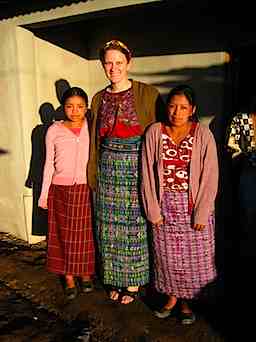 scholarships for Guatemalan children. I got the forms, I got the girls excited. We started gathering all the necessary information to fill out the applications. The deadline came up fast, and at one point the girls had to come over to our house before 6 am one morning to give us the last of the information we requested, before we had to take off for a trip south, so I could get the forms in on time. Here we are together when the girls dressed me up in traje for the video they sent home to our parents at Christmas; Maricela in on R, Elisea on L. scholarships for Guatemalan children. I got the forms, I got the girls excited. We started gathering all the necessary information to fill out the applications. The deadline came up fast, and at one point the girls had to come over to our house before 6 am one morning to give us the last of the information we requested, before we had to take off for a trip south, so I could get the forms in on time. Here we are together when the girls dressed me up in traje for the video they sent home to our parents at Christmas; Maricela in on R, Elisea on L.
I felt and for months continued to feel really jazzed about this project. Getting these girls to school has so many advantages: they will have a paying profession in health; they will earn a steady wage; they will contribute to a field desperately in need of employees especially with Mayan language skills; they can help provide the family with enough money to get their younger siblings through school; they will be positive examples to others in their village who are struggling to educate themselves and find a viable career. This is an all around great project! And the girls were wide-eyed with anticipation for months. Would they get the money, or wouldn’t they? I reminded them that this was not a last ditch effort, but our first attempt. They would ask me if I’d heard anything every time they saw me. Their father/uncle came to talk to me about whether or not I’d heard anything as soon as we got back from the states mid-January, then a week later the girls came to ask. I was waiting for information myself. FINALLY I heard back from FOG. They awarded the girls as much as they could, which was less than 1/3 of what the girls would need. It was something, anyway. I started looking for ways to do supplimentary funding, and I called the girls over to tell them the news. Then a bomb was dropped on this project before they even arrived, and made worse with their arrival. The local nurse informed me that all programs to study nursing required that students be 18 to study. That knocked out Maricela, which was a total bummer. But when I called the girls over, I was really rather annoyed that they hadn’t informed me of this earlier. I asked them why they never bothered to tell me. “Well, señor, (they suddenly began addressing me like a teacher/strict authority figure rather than just using my first name like they’d always done before), we just never had time. You went to the states, and when you came back we never had money on our phone. And then we never had time to come visit you.” Excuses, excuses. These were all lies. They just hadn’t bothered to tell me. They’d come and visited us a million times, and sent me text messages to call them for other things. Never once did they mention, “oh, hey, you know we got word that now they’ve made the 18 year old age limit a requirement”! I was so frustrated. I thought I explained all of these things to them, and there was no point in chiding them about making up excuses because I would have had to listen to MORE excuses, which would have just made me madder. I told Maricela that she wouldn’t be old enough to do the one year program while we were here so we couldn’t sponsor her. I told her this didn’t mean she could not do the program, as there will always be other volunteers and there are various scholarship programs she could still look into. Elisea was the remaining hope, as she is already 18. But she took this time to tell me that she found out in December she didn’t pass last year’s classes, which meant she had to retake them, then finish her last year of high school after that. This means we’ll be gone by the time she’s ready to start the nursing program also. The final kicker, however, is that after she learned she needed to retake last years courses, she was so busy working on an adult literacy program (and that is good) she didn’t bother to sign up for classes this year, AT ALL.
People here, more often than not, seem to evade responsibility for things. It’s worked into their phrasing. One example, no one says, “I forgot” they say, “It was forgotten” as though it was beyond them to remember it. Another stronger force caused the forgetting. It drives me insane! It’s like leaving EVERYTHING to the voluntad de dios, the will of God, when it’s clearly something we should be taking responsibility for ourselves.
Anyway, I didn’t want to get so mad as to scare them off forever, or completely discourage them from trying, though I certainly felt that angry with them. I felt completely used. I had to thoroughly, sternly explain to them all the ways what they did was irresponsible and wasteful. They wasted not just A LOT of my time, but more importantly, they wasted both Fletch’s and my one opportunity as volunteers to sponsor a scholarship for anyone here in all the valley during our service. Additionally, I already have the money deposited in my personal bank account, so now I have to call the FOG coordinator (a very busy guy who’s not always easy to get a hold of), explain the situation and ask how I should handle the money. I think the only option is to return it to him, but I will tell him about other projects and see if he wants us to put the money into other educational endeavors, if that’s easier. I don’t know. It’s SO FRUSTRATING. I really thought these girls “got it” about the importance of education. I believed in them and their need. Now I just feel like an idiot.
My biggest fear is now that Elisea hasn’t bothered to sign up for school this year, she’ll just quit and be done forever. That really kills me. At least Maricela is still studying. We’d already invited Elisea to the AIDS seminar, and would’ve invited both the girls if we’d been allowed to bring one more person. Thus, I chose to end the lecture on a more positive note, talking about the seminar and the work we have coming up in their village, what we needed from them in regards to the work. They seemed to relax a bit. But really, I was so mad at them, I just wanted them to leave. I think I did a fair job of hiding the full extent of my anger until they left.
Once they were gone, I just felt like, surely I must have failed here somewhere too. I feel like I was probably too eager to help these girls. To some extent, I failed to gather enough of my own information and lept before looking. It’s just so hard to get the facts from anyone here that I thought the girls would be effective at getting it because they probably understood how things work better than I do. I also trust people a lot (too much?), but my instinct to trust people is based on my own cultural norm of people being responsible. Even in the US I’m somtimes let down, but here the chances are oh so much greater for things to go wrong. And they did. I also can’t just give up and walk away. I can still be a positive force in their lives, a good mentor for them. It’s not unreasonable to think when I return to the US I could earn the money to send them to nursing school myself. By then I’d have a much better read on the situation to determine if that was really a good idea or not. Though at the moment that’s a very distant possibility. Once they’d been gone for a while and I’d been going over the situation in my head, I had this strong sense of, “This is what it must be like to be a parent.” Obviously I’m not one, nor have ever been, but I imagine that if I had kids they would probably manage to piss me off that badly too, and I’d have to be awfully careful about how I reproached and disciplined them. It was weird, as I think almost on a daily basis, I’m not ready to have kids or that I don’t want to have kids for a long while. And here I am, I thought, acting like somebodies mother.
That’s one project down. Though I still do have to figure out how to return the money, so I guess it’s not all the way over until the money is no longer in my account. Bummer, to say the least.
Posted by: emily
Tuesday, March 10th, 2009 at 8:40 am
Last week was a busy week, and a very exciting one for our Mayan coworkers. The Peace Corps received a big grant to increase AIDS awareness in Guatemala, so they invited all of us volunteers in the Health and Youth Development programs to bring two community leaders with us to a two-day AIDS awareness seminar. The idea is that by teaching the community leaders about AIDS, and specifically how to present the same seminar in their communities, word can get out about this dangerous disease that most Guatemalans have never heard about. Sadly, Guatemala has about 10,000 reported AIDS cases- but the World Health Organization estimates the real number is about 60,000.
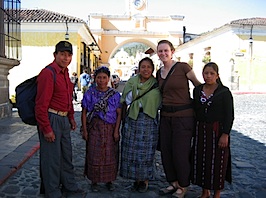 The seminar was held in Santa Lucia, at the Peace Corps headquarters/ training center. Part of the funding was travel expenses, food, and hotels for the participants. Since PC/HQ is about 10 minutes away from Antigua, and they put us up in hotels there, this had the pleasant side effect of being a PAID VACATION for everyone attending. One of the best parts of the week was when our four villagers arrived and Emily and I took them to their hotel. Three of the four had never been to Antigua before, and they all had their jaws on the floor. The youngest, Elisea, had never even left the departamento (state) of Huehuetenango before. “Have you ever seen so many gringoes?” I asked her as she made her way through the cobblestone streets, wide-eyed. She just shook her head no. Here’s a photo of our villagers, posing in front of one of Antigua’s more famous landmarks. Left to right: Manuel Jesús, president of the Health Comittee; his wife Abelina (with their baby on her back), president of the Womens’ Comittee; Lucia Diego, the nurse at our health post; Emily; and Elisea Juarez, an involved citizen who translates Q’anjob’al for us at charlas. The seminar was held in Santa Lucia, at the Peace Corps headquarters/ training center. Part of the funding was travel expenses, food, and hotels for the participants. Since PC/HQ is about 10 minutes away from Antigua, and they put us up in hotels there, this had the pleasant side effect of being a PAID VACATION for everyone attending. One of the best parts of the week was when our four villagers arrived and Emily and I took them to their hotel. Three of the four had never been to Antigua before, and they all had their jaws on the floor. The youngest, Elisea, had never even left the departamento (state) of Huehuetenango before. “Have you ever seen so many gringoes?” I asked her as she made her way through the cobblestone streets, wide-eyed. She just shook her head no. Here’s a photo of our villagers, posing in front of one of Antigua’s more famous landmarks. Left to right: Manuel Jesús, president of the Health Comittee; his wife Abelina (with their baby on her back), president of the Womens’ Comittee; Lucia Diego, the nurse at our health post; Emily; and Elisea Juarez, an involved citizen who translates Q’anjob’al for us at charlas.
Our village is the farthest out of any of the participants, so we got the Peace Corps to fund our delegation for an extra night before the conference started. As it was, Manuel and his crew left our village at 3am. Since the buses don’t start until 6:15am, they walked an hour out of the valley in the dark to get to the main highway to catch an earlier intercity bus. This made it possible for them to arrive in Antigua before dark. There was some confusion, and the Peace Corps forgot to book their rooms for an extra night, so Emily and I put them up at the Dia Verde, a cheap backpacker hostel we use a lot when we have to go to Antigua. We know the manager, Vera, and she always treats us well. Once they were situated, we told them where to find comida tipica (local, Guatemalan food like beans and tortillas) since they wouldn’t be interested in spending big bucks on gross tourist food like nachos and pizza and hamburgers and spaghetti. Which makes my mouth water just thinking about it, and is the main reason Peace Corps volunteers ever go to Antigua.
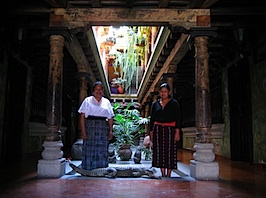 The next morning, we picked them up and moved them to their new hotel, a place WAY nicer than any Peace Corps volunteer could ever afford (Emily asked, and rooms there are 180q a night, or about $23). They were pretty blown away, and asked to have their pictures taken. We’re going to print them out so they can keep a recuerdo of their trip to the big city. The next morning, we picked them up and moved them to their new hotel, a place WAY nicer than any Peace Corps volunteer could ever afford (Emily asked, and rooms there are 180q a night, or about $23). They were pretty blown away, and asked to have their pictures taken. We’re going to print them out so they can keep a recuerdo of their trip to the big city.
The conference itself was fun. Most of the Peace Corps volunteers had already seen the material; in fact, Emily Alta, Joe, Anne and I had to GIVE this workshop to 200 middleschool students during training. But this was about the Guatemalans. They learned about AIDS, but more importantly, learned techniques about presenting this infromation to others. It’s a tricky thing: the educational system here is one of rote memorization: teachers write on the board, students copy into their notebooks, everyone goes home. No one really learns anything. For topics of a sensitive nature, it’s even worse. Our teaching methodology is different; we do dynamic paticipative activities. Here we have our counterparts pretending to be white blood cells being attacked by the HIV virus. In the next picture, they are wearing signs describing the steps to putting on a condom, trying to rearrange themselves into the correct order. We also give everyone a chance to present part of the information, to become the teachers temselves.
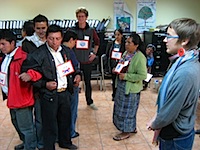 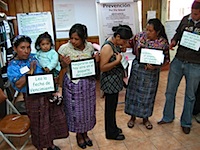 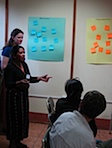
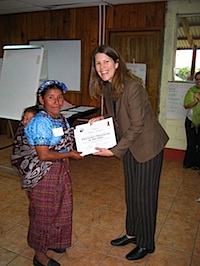 Now, you might think this is kindof edgy stuff for an ultraconservative society. IT IS! I was a bit worried how it would go over, but everyone seemed to get into it. At the end of the conference, we had a planning session where we worked out when we would give this seminar in our communities, to whom, and which groups would be likely to boycott. We eventually decided that we will give this seminar 4 times in April: once to the village leaders (I dread that one), once to the womens’ group, and twice to two different schools in the valley. Right before we went home, all of the participants got diplomas. Diplomas are a big deal to Guatemalans, since formalized education of any type is rare, and records aren’t well kept by educational institutions. Oftentimes a diploma is the only proof you have. Now, you might think this is kindof edgy stuff for an ultraconservative society. IT IS! I was a bit worried how it would go over, but everyone seemed to get into it. At the end of the conference, we had a planning session where we worked out when we would give this seminar in our communities, to whom, and which groups would be likely to boycott. We eventually decided that we will give this seminar 4 times in April: once to the village leaders (I dread that one), once to the womens’ group, and twice to two different schools in the valley. Right before we went home, all of the participants got diplomas. Diplomas are a big deal to Guatemalans, since formalized education of any type is rare, and records aren’t well kept by educational institutions. Oftentimes a diploma is the only proof you have.
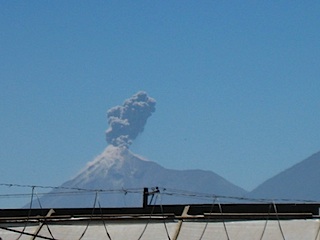 Everyone had a great time, and will probably go home with a lot of stories for their friends and neighbors, as well as memmories that will last for a long time. The day we left, one of the volcanos that surrounds Antigua (Volcán Fuego) exploded, as a farewell. It does that sometimes. Guatemala is cool that way. Everyone had a great time, and will probably go home with a lot of stories for their friends and neighbors, as well as memmories that will last for a long time. The day we left, one of the volcanos that surrounds Antigua (Volcán Fuego) exploded, as a farewell. It does that sometimes. Guatemala is cool that way.
Posted by: jfanjoy
Monday, March 9th, 2009 at 9:07 pm
We headed out of Santa early in the morning to get to our meeting with Peace Corps and the Ministry of Health. All the volunteers had to prepare presentations about all the projects we’re doing, how they’re going, what challenges we’ve encountered, what lessons we’ve learned. Since this is a brand new program our PC project directore is trying to iron out the wrinkles as we go, and I think he’s doing a pretty good job. It’s definitely not an easy task. What we found out at this meeting is something we’ve suspected along: we got REALLY lucky as far as where we were sent and the counterparts we work with in our home site. Some of our friends haven’t made out so well. It sometimes happens that getting a PCV in some towns is like having a trophy that walks around and talks. Certain leaders want to show off the trophy, but they don’t want to do anything with it. One of our friends is having a pretty big problem with this at the moment, and it remains to be seen how the situation will be remedied. Really, any problems or setbacks we’ve suffered so far have been minimal to some things our volunteer friends have been putting up with. This is a difficult spot to be in, because we don’t want to shove it down anyone one’s throat that things are going pretty well for us, but we also don’t want to be dour for someone else’s benefit, so we did the best we could.
After we wrapped up our presentation and sat down, Fletch looked at me and said, “I feel like I’m sitting beside myself. This is not a good sign.” We were the last to present, thankfully, but by the time we got to the hotel in the early afternoon he was already running a fever, and we had an appointment to meet with the local Rotarian president that night. We were supposed to head to Xela for a good friend’s birthday weekend the next day just for a little fun and socializing with our friends we see too infrequently, but I figured we should go home if he wanted to. I ran out and got him medicine, then left him napping while I caught up on some very belated letters to friends. And once he woke up he was alright to go out to dinner, not great, but ok, and he wanted to go to the birthday party because we were supposed to go sit in the hot springs much of Friday. He wasn’t going to find a hot bath anywhere close to home if we turned around, but he was definitely in the mood for one. I was surprised how well he held up for the somewhat battering ride from Huehue to Xela and then to the hot springs. I think it was just the idea of sitting in hot water for hours on end that kept him going. Secretly, I was glad he’d decided he could make the trip, as I really wanted to see everyone too.
From Xela you have to take a bus fro about 30 minutes where they drop you on the side of the highway. From there, you stand at the edge of a dirt track until a truck comes along and will negotiate a price to take you the rest of the way up into the mountains. We could’ve walked, but it would’ve taken about 2 hours, and I’m not sure Fletch would’ve held up. Luckily we only had to wait 5 minutes or so until this nice young guy came by offering a fair priced ride in…the back of a pick-up. In groups we always seem to ride in the back of trucks, but for limited amounts of time, it’s actually pretty fun.
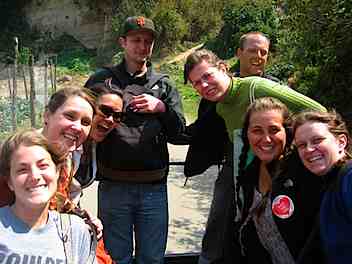 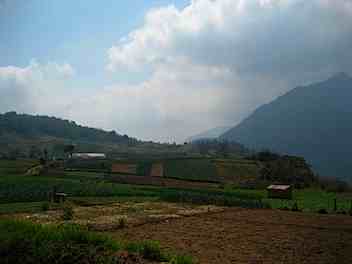
The scenerey was Guatemala, pretty beautiful. Honestly I’ve never heard a volunteer claim that their site was anything less than beautiful. We had to drive through tons of croplands, getting sprayed by random sprinklers and a little mud splatted up our backs (poor Lyn in her pretty white shirt…), but we were going to take a bath, right? A great time was had by all, on the truck rides and at the baths. From left to right: Casey, Anne, Lynn, Dan, Jaime/Fletch, Emily, Ashley, and me.
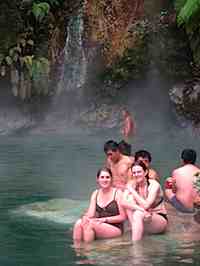 So here are the actual springs, and while Anne and I are having a good time, I think this picture is funny from the top half up. The guy in the back looks like model from an advertisement, for soap or hair products, in this hot spring with his muscles and long hair. At one point a group of us girls were sitting in the pavillion area snacking away on junk food, and we realized, oh, there are the showers, and this very attractive man is in it, right in front of us. Suddenly, I can’t remember who–just that it wasn’t me, even if it sounds like something I would do–felt the need to exclaim “There’s a hot guy in the shower!” forgetting we were not in run of the mill Guatemala, but at a tourist destination. And the guy did indeed speak English. We had no choice but to fall over laughing, all of us, like we were 12. Sometimes we are just all class here. We must be careful about using English as the default language… So here are the actual springs, and while Anne and I are having a good time, I think this picture is funny from the top half up. The guy in the back looks like model from an advertisement, for soap or hair products, in this hot spring with his muscles and long hair. At one point a group of us girls were sitting in the pavillion area snacking away on junk food, and we realized, oh, there are the showers, and this very attractive man is in it, right in front of us. Suddenly, I can’t remember who–just that it wasn’t me, even if it sounds like something I would do–felt the need to exclaim “There’s a hot guy in the shower!” forgetting we were not in run of the mill Guatemala, but at a tourist destination. And the guy did indeed speak English. We had no choice but to fall over laughing, all of us, like we were 12. Sometimes we are just all class here. We must be careful about using English as the default language…
For a bit it seemed the springs had made Fletch feel a little better, but it was really just a trick. He got sicker and sicker. Here is cuddling with our friend Zach on the ride back from the springs. Zack hadn’t brought a jacket and was very cold, then mysteriously he showed up at our in service training last week sick with the same symptons Fletch had. Too bad for Zach, Fletch didn’t get him sick, a mosquito did. A blood test showed the poor guy is the fir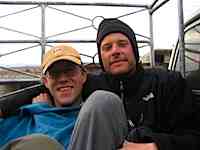 st from our training group to come down with denghi. At least Fletch didn’t have that. Sometimes the symptons get so bad people report feeling like their bones are breaking. My spanish teacher from training said when he had it his skin was so sensitive for a few days he felt it was burning if anything touched it. The worst part about denghi is that there is no medecine for it because it’s a virus, just tylenol to control the fever and help reduce the body-aches. This is another reason we are thankful we live in cold climates. We do not have mosquitos hardly ever, and they don’t have denghi all the way up here. st from our training group to come down with denghi. At least Fletch didn’t have that. Sometimes the symptons get so bad people report feeling like their bones are breaking. My spanish teacher from training said when he had it his skin was so sensitive for a few days he felt it was burning if anything touched it. The worst part about denghi is that there is no medecine for it because it’s a virus, just tylenol to control the fever and help reduce the body-aches. This is another reason we are thankful we live in cold climates. We do not have mosquitos hardly ever, and they don’t have denghi all the way up here.
Fletch wanted me to hang out with everyone, since he couldn’t. So I spent the weekend, running to hang out with our friends, running back to take his temperature and give him more pills. By Saturday evening he showed no signs of improving, so I decided I was going to call the PC nurses. Just as I was headed out to do so he asked, rather pathetic sounding, “Can you do one more thing? Can you call the nurses to see if we should be doing anything else…” I laughed and told him I was on my way to do it, I just wasn’t going to tell him in case he told me not to. Thus began the dialogue with the nurses that had Jaime locked in the hospital by Monday morning, undergoing one test after another.
I must say, I’m glad he’s generally healthy, because he’s a pretty big grumpy pants in the hospital. He almost walked out of the hospital before the doctor came to see him, and I feel if he’d been there by himself he probably would have made it. I have a huge fear of people being mad at me, and I was afraid the PC nurses would be pretty angry about such conduct, so I kept shuffling my feet. Just when I couldn’t hold him off any longer the doctor came in to see him and told him how it was going to be. Thank god. It’s not that I wanted him, or me for that matter, to be stuck in the hospital, but I didn’t know what was wrong with him, and I certainly wasn’t succeeding at making him better. So from then on my job was to run around and coordinate things, and try to keep grumpy pants from getting grumpier. It was a long, tedious week, for both of us as you can tell by reading his account of it all. I spent it sleeping on a bench in his room. But, as Monty Python would say, he got better. Yay. We finally got to go home, double YAY. And again, we had five days at home before we had to leave AGAIN.
Posted by: emily
Monday, March 9th, 2009 at 3:31 pm
I think Sundays are some of the worst days for homesickness in Guatemala because weekends were religiously relaxing for us in the states. We’d go to the park, have brunches and/or picnics with friends, enjoy the sun, the snow, the rain, whatever the weather; we’d work on projects. Sunday could be extremely social or extremely introverted or well balanced between the two. Now I think of Sunday, the way it used to be, as a reflection of how much power of choice and freedom we had then, that, while we enjoyed it all, we never knew how different things could be. Here, no matter the day of the week, people will wake us up at 6 or 7 for some non-sequiter request. Where we can go is limited (no car for Sunday driving to fun destinations), and we HAVE to go to the market early Sunday morning if we want to eat any produce for the week. The market is a lot of work. Our close friends and family who know us best, who understand us, aren’t here to share with. Sundays often feel like any other day of the week, and frankly I think it’s quite a shame. But the memory of the good old Sunday gives me something to look forward to in fall of 2010.
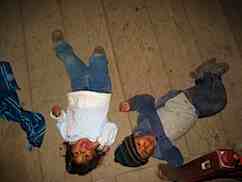 Once we bid Elke fairwell, we had a whopping four days in site before we had to leave again. Elke left on Saturday mid-morning. On Sunday after returning from the market, I was cutting up strawberries to make a crepe sauce for brunch. We’d decided to try and make the best of our first full day at home and alone in weeks. After all, it was Sunday. Why not try and recreate the old ambiance, but with the unavoidable addition of the visiting neighbor kids? And sure enough, they came. Delvin and Michelle apparently caught on to the air of relaxation in the house as I invited them in. We were dancing around to our music and cooking. They always ask for food, and I like to share so I was slipping them every third or fourth strawberry. I turned around and laughed out loud, as they were laying on their backs on the floor, legs bobbing to the music, eating strawberries. They were the amusement for our relaxing Sunday. Often I think kids make Peace Corp what it is for almost all volunteers. Sometimes the kids drive me nuts when I just want to be left alone and they’re outside the house yelling whatever version of our names they’re able to pronounce–very rarely is it the correct version–, but more often than not they’re pretty fun to have around. And as for Sundays, well, we just have to make of them what we can. They have their bright spots here too, and this life is awfully temporary in the big scheme of things. Once we bid Elke fairwell, we had a whopping four days in site before we had to leave again. Elke left on Saturday mid-morning. On Sunday after returning from the market, I was cutting up strawberries to make a crepe sauce for brunch. We’d decided to try and make the best of our first full day at home and alone in weeks. After all, it was Sunday. Why not try and recreate the old ambiance, but with the unavoidable addition of the visiting neighbor kids? And sure enough, they came. Delvin and Michelle apparently caught on to the air of relaxation in the house as I invited them in. We were dancing around to our music and cooking. They always ask for food, and I like to share so I was slipping them every third or fourth strawberry. I turned around and laughed out loud, as they were laying on their backs on the floor, legs bobbing to the music, eating strawberries. They were the amusement for our relaxing Sunday. Often I think kids make Peace Corp what it is for almost all volunteers. Sometimes the kids drive me nuts when I just want to be left alone and they’re outside the house yelling whatever version of our names they’re able to pronounce–very rarely is it the correct version–, but more often than not they’re pretty fun to have around. And as for Sundays, well, we just have to make of them what we can. They have their bright spots here too, and this life is awfully temporary in the big scheme of things.
Sunday and Monday were filled with marimba music, of course. Monday there was a big parade in town, with kids from almost all the local schools marching. It was quite festive. We had to get up and out of town by 7 so as not to miss it. All the older kids in our family, Lucia, Galindo, and Lina, were marching and wanted us to take pictures of them, so we promised we’d be there. This is one of the biggest smiles I’ve ever seen on Lucia’s face, and a very happy, healthy looking Galindo.
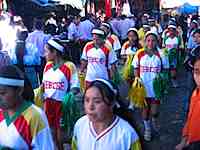 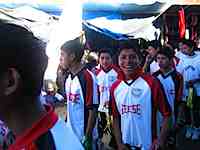
The parade had band kids (instruments are a thing often donated to Guatemala, I gather), groups of girls in traditional dress, random animal costumes, girls dressed as giant flowers, black beret and sunglass clad kids–I don’t know how they decided who got to/had to wear what costumes. One of the most amusing parts of the parade was watching how many kids suddenly tripped up on their dance steps as soon as they saw the gringos. If I’d had a dollar for every time… It was pretty festive, though lacking a bit in organization. For some reason, the people who planned the official route did not make it a circuit, but a one way march into a dead end that backed up. Consequently they had to have all the groups turn around and march back to where they came from, reducing the incoming groups performance space to half the original width, lots of confusion and running around trying to fix it, as three school bands played different songs simultaneously right in front of us. We had to laugh…and Fletch had to call his favorite school teacher to share the joy of the moment with him. ahaha. We were hung up on, but later he called back to make sure we were all ok.
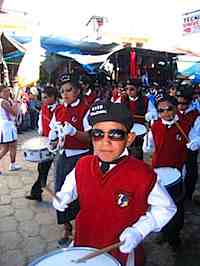 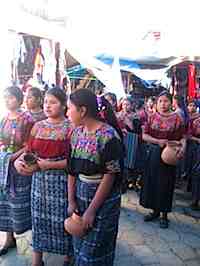 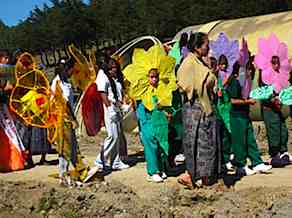 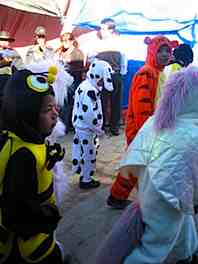
Randomly, we met a local radio announcer, Lorenzo, as the parade was dying down. He’d spent some time in the states and spoke a bit of English. He was excited to use it to invite us on a tour of the radio station and show us how it worked. Once we got there, he asked us to share our impressions of their festival with the pueblo on the air, an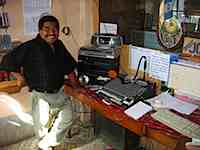 d he then thanked us for being honored guests. This part of the day cracked us up. You really just never know what’s going to happen here. d he then thanked us for being honored guests. This part of the day cracked us up. You really just never know what’s going to happen here.
Tuesday we hiked almost an hour to get to the center of the festival in a bigger village halfway between here and the main town. The church yard was full of dancers in amazing costumes, and the valley was full of food and game vendors. The costumes from the baile de la conquista or the Dance of the Conquest, were pretty amazing. They were apparently rented from Xela/Quetzaltenango, a city some seven hours from here, because none of the dancers can afford to own the costumes themselves. We watched them for a while, but since we weren’t in our village and not well known in this area many of the spectators spent a lot of time watching us. I was really thankful Pedro, our Mayan language teacher, was coming to meet us soon. People are a lot less suspicious about us when we have a local guide. As soon as he showed up and people saw we weren’t some gringos who’d gotten lost and crashed their party, the dancers even started to include us in their routine. This was the bull, rushing Fletch. I love this picture where I caught one of the youngest dancers on break enjoying her cotton candy.
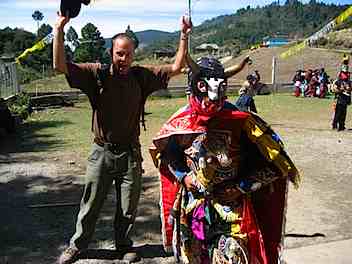 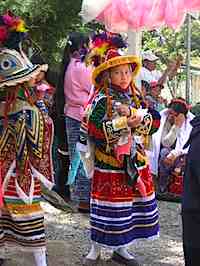
Ironically, after all the cold and nasty weather while Elke was here, it was warm and sunny all day from the time she left until we had to leave town again. The hiking to and from the festival was nice. We found a rare treat on sale with the fruit vendors after watching the dances–raspberries! So we bought a pound, hiked home, and baked a mini-pie, mmmm. I’m so thankful my mother-in-law taught her sons how to bake. Fletch makes the BEST pie crusts ever. While we were sitting eating the pie, drinking tea and coffee, staring out the windows at the clouds and trees on the other side of the valley, I thought out loud, “Man, I really wish I had something interesting and new to talk about with you. I feel like this dessert warrants better conversation.” He laughed out loud and said he was thinking the exact same thing. Ahhh, some day we’ll be interesting to each other again….This is probably Peace Corps biggest challenge to the marrieds. But the pie was awfully tasty, and the day was pretty, so we just concentrated on those things. And we could easily be our unmarried volunteer friends, who sit and eat the whole pie by themselves wishing they had company.
I think the feria made us grateful, once again, for not living in town, where most of the loud raucous partying was going on. We had a lot more freedom to choose to be or not be part of the activities. We didn’t have enough energy to go to the marimba dancing in Temux on Sunday night, and all the other dances were in town. We spent the last night of the feria staying the night in Santa with Pedro, our language teacher, and his family, as we had to leave earlier than the first bus out of our village to get to our mandatory meeting in the capital. This did allow us to see the torritos, a hilarious and 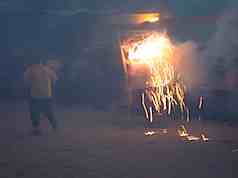 dangerous little thing they do to celebrate around here. I have a feeling the point, at least originally, was to mock the Spanish, much like the dances. I mean, someone runs around with a box on their head pretending to be a bull, as fireworks shoot off in all directions, and the bullfighter antagonizes the “bull” then runs like crazy to escape the fireworks. It was remeniscent of the correfoc in Barcelona–a parade of demons that all had fireworks attached to them and went off all over the packed streets of the barrio gottico. However, in Barcelona the spectators were much better prepared. Everyone goes dressed head to toe in jean jackets, hats, and hang damp towels and handkerchiefs over their heads and faces. So the parade is a parade of demons that explode over what looks like an enormous crowd of bandits. Here, there was lots of out of control fireworks and people just hoping nothing would happen to them while watching the show. They always seem to leave these things to la voluntad de dios, the will of God…but no one was hurt this year. Yay. Or should we say, thank God for small favors? dangerous little thing they do to celebrate around here. I have a feeling the point, at least originally, was to mock the Spanish, much like the dances. I mean, someone runs around with a box on their head pretending to be a bull, as fireworks shoot off in all directions, and the bullfighter antagonizes the “bull” then runs like crazy to escape the fireworks. It was remeniscent of the correfoc in Barcelona–a parade of demons that all had fireworks attached to them and went off all over the packed streets of the barrio gottico. However, in Barcelona the spectators were much better prepared. Everyone goes dressed head to toe in jean jackets, hats, and hang damp towels and handkerchiefs over their heads and faces. So the parade is a parade of demons that explode over what looks like an enormous crowd of bandits. Here, there was lots of out of control fireworks and people just hoping nothing would happen to them while watching the show. They always seem to leave these things to la voluntad de dios, the will of God…but no one was hurt this year. Yay. Or should we say, thank God for small favors?
Pedro was a very happy host. His family has been offering us a place to stay, if we ever need it, since we arrived. The weather was beautiful and he got the opportunity to do something I think he’s wanted to do for a while–invite Fletch to have a beer with him. He asked my permission first, since he has a wife who was raised in an extremely anti-alcohol family. Ever the gender bender, I asked him if it would be ok if I joined them, and he seemed happy about that. I got a lot a looks at the bar, but the weather was perfect for a beer, and, hey, we are trying to challenge people’s norms a little here. I definitely think Pedro is one of our best friends here, as he seems to be the closest to really understanding who and what we are. I wish I could feel the same about his wife. She’s really nice, but she has very limited Spanish, and I have very limited q’anjobal for the time being, and she definitely is a doting host. I’d like to get to the point where she lets me help out some, and doesn’t feel obligated to serve me, but that might be very wishful thinking.
The only marimba dancing we did during the festival was in the kitchen at Pedro’s house, with his ancient mom and dad, his sister Lucia (also the nurse in our village and how we met Pedro), and her 8 year old son Ronald. Everyone loves to see us dance, and they always comment on how great we are at it, which kills us, because the dance is SO simple and easy. The thing is, we never seem to escape it entirely, but I much preferred the private kitchen setting, where everyone actually joined in, to the great big rooms of people who stop to stare at us dancing at the big parties. It was totally worth it to see Pedro’s tiny little Mayan-to-the-core parents laughing and dancing along with us. I bet they never imagined they’d come to know a couple of giant gringos who’d dance to the marimba in their kitchen. It was fun and funny, and we were so caught up in dancing Fletch didn’t get a single shot in…so you’ll just have to imagine it.
I fell dead asleep after the dancing, but Fletch stayed up shivering with the beginnings of a fever….bleh. And so ended the Festival of Santa Eulalia.
Posted by: emily
|
|
|
 Welcome to the third installment of the “matando” series of lectures, where we talk about traditional rural meat processing techniques. Previous entries included matando kalnel (killing sheep), matando txitam (killing pigs), and today’s will be matando kaxlan (killing chickens).
Welcome to the third installment of the “matando” series of lectures, where we talk about traditional rural meat processing techniques. Previous entries included matando kalnel (killing sheep), matando txitam (killing pigs), and today’s will be matando kaxlan (killing chickens). So, we headed off on a hike to the neighboring village, where they sell roasting chickens. They sent Chalio and Alberto as our hobbit guides. Not only did we not know where the chickens were to be found, but we also don’t speak enough Q’anjob’al to do a good job with the negotiations. Turns out, sending the kids to help the bumbling adults was a great idea. Chalio did as good a job as you could expect from any 10-year-old, and he picked out the biggest chicken in the pen. He then got them to charge us only 90q instead of the expected 100. Success!
So, we headed off on a hike to the neighboring village, where they sell roasting chickens. They sent Chalio and Alberto as our hobbit guides. Not only did we not know where the chickens were to be found, but we also don’t speak enough Q’anjob’al to do a good job with the negotiations. Turns out, sending the kids to help the bumbling adults was a great idea. Chalio did as good a job as you could expect from any 10-year-old, and he picked out the biggest chicken in the pen. He then got them to charge us only 90q instead of the expected 100. Success! When we arrived at our neighbor’s, Emily asked how they kill it. We had imagined cutting heads off with axes and chickens running around headless, as we were told by our grandparents, but it turns out it’s a lot less dramatic or messy. Masha holds the chicken so it can’t flap, and Reyna twists the head around and around. At some point, it’s more than the design load of the chicken, and death results.
When we arrived at our neighbor’s, Emily asked how they kill it. We had imagined cutting heads off with axes and chickens running around headless, as we were told by our grandparents, but it turns out it’s a lot less dramatic or messy. Masha holds the chicken so it can’t flap, and Reyna twists the head around and around. At some point, it’s more than the design load of the chicken, and death results. The rest of it was pretty straightforward. I only cringed at one part, and it was not because of all the blood-n-guts. Check out what they’re doing with that nice knife I got them for christmas: they’re cutting with it directly on concrete! AAAAAAA! When you give something away as a present, you just have to let it go, I guess. Let it go. Let it go.
The rest of it was pretty straightforward. I only cringed at one part, and it was not because of all the blood-n-guts. Check out what they’re doing with that nice knife I got them for christmas: they’re cutting with it directly on concrete! AAAAAAA! When you give something away as a present, you just have to let it go, I guess. Let it go. Let it go.




































